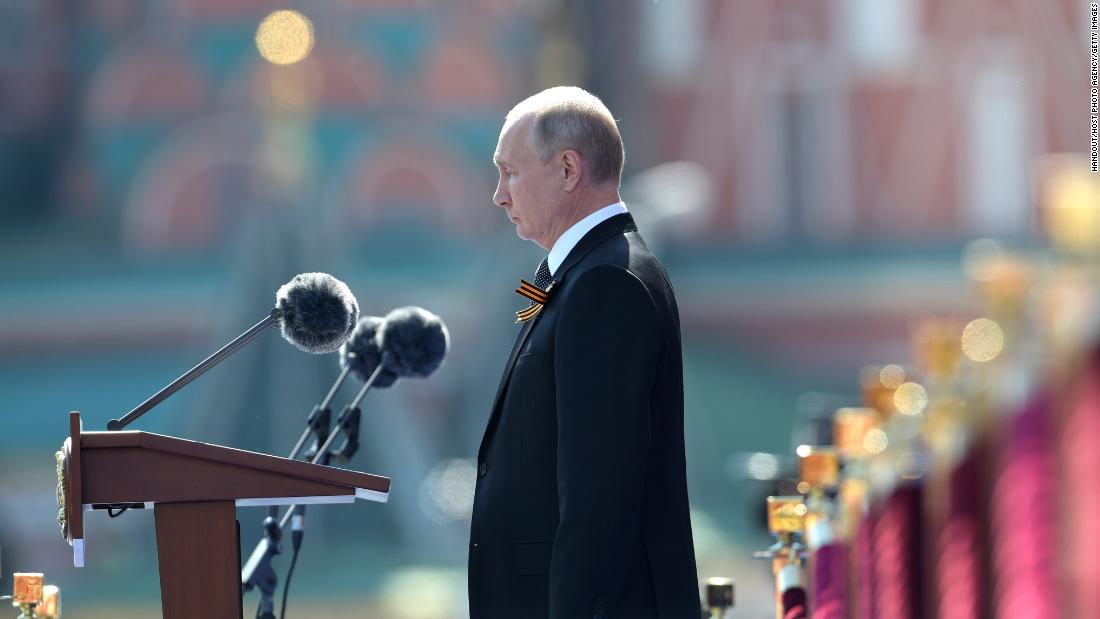Media
US announces sanctions against Kremlin-controlled media companies and bans Russia from using some American consulting services – CNN


Washington (CNN)The US announced a slate of new sanctions against Russia on Sunday, cutting off Kremlin-controlled media outlets from American advertisers and prohibiting the country from using US-provided management and accounting consulting services, according to a senior administration official and a White House fact sheet.
Media
B.C. online harms bill on hold after deal with social media firms
|
|
The British Columbia government is putting its proposed online harms legislation on hold after reaching an agreement with some of the largest social media platforms to increase safety online.
Premier David Eby says in a joint statement with representatives of the firms Meta, TikTok, X and Snapchat that they will form an online safety action table, where they’ll discuss “tangible steps” toward protecting people from online harms.
Eby added the proposed legislation remains, and the province will reactivate it into law if necessary.
“The agreement that we’ve struck with these companies is that we’re going to move quickly and effectively, and that we need meaningful results before the end of the term of this government, so that if it’s necessary for us to bring the bill back then we will,” Eby said Tuesday.
The province says the social media companies have agreed to work collaboratively with the province on preventing harm, while Meta will also commit to working with B.C.’s emergency management officials to help amplify official information during natural disasters and other events.
The announcement to put the Bill 12, also known as the Public Health Accountability and Cost Recovery Act, on hold is a sharp turn for the government, after Eby announced in March that social media companies were among the “wrongdoers” that would pay for health-related costs linked to their platforms.
At the time, Eby compared social media harms to those caused by tobacco and opioids, saying the legislation was similar to previous laws that allowed the province to sue companies selling those products.


Eby said one of the key drivers for legislation targeting online harm was the death of Carson Cleland, the 12-year-old Prince George, B.C., boy who died by suicide last October after falling victim to online sextortion.
“In the real world we would never allow a company to set up a space for kids where grown adults could be invited in to contact them, encourage them to share photographs and then threaten to distribute those photographs to their family and friends,” Eby said when announcing the legislation.
The premier said previously that companies would be shut down and their owners would face jail terms if their products were connected to harms to young people.
In announcing the pause, the province says that bringing social media companies to the table for discussion achieves the same purpose of protecting youth from online harm.
“Our commitment to every parent is that we will do everything we can to keep their families safe online and in our communities,” said Eby.
Ryan Cleland, Carson’s father, said in a statement on Tuesday that he “has faith” in Eby and the decision to suspend the legislation.
“I don’t think he is looking at it from a political standpoint as much as he is looking at it as a dad,” he said of Eby. “I think getting the social media giants together to come up with a solution is a step in the right direction.”
Business groups were opposed
On Monday, the opposition B.C. United called for a pause to Bill 12, citing potential “serious legal and economic consequences for local businesses.”
Opposition Leader Kevin Falcon said in a statement that his party pushed Eby’s government to change course, noting the legislation’s vague language on who the province can sue “would have had severe unintended consequences” for local businesses and the economy.
“The government’s latest retreat is not only a win for the business community but for every British Columbian who values fairness and clarity in the law,” Falcon said.


The Greater Vancouver Board of Trade said they are pleased to see the legislation put on hold, given the “potential ramifications” of the proposal’s “expansive interpretation.”
“We hope that the government chooses not to pursue Bill 12 in the future,” said board president and CEO Bridgitte Anderson in a statement. “Instead, we would welcome the opportunity to work with the government to develop measures that are well-targeted and effective, ensuring they protect British Columbians without causing unintended consequences.”





Media
Trump poised to clinch US$1.3-billion social media company stock award
|
|


Donald Trump is set to secure on Tuesday a stock bonus worth US$1.3-billion from the company that operates his social media app Truth Social (DJT-Q), equivalent to about half the majority stake he already owns in it, thanks to the wild rally in its shares.
The award will take the former U.S. president’s overall stake in the company, Trump Media & Technology Group (TMTG), to US$4.1-billion.
While Mr. Trump has agreed not to sell any of his TMTG shares before September, the windfall represents a significant boost to his wealth, which Forbes pegs at US$4.7-billion.
Unlike much of his real estate empire, shares are easy to divest in the stock market and could come in handy as Mr. Trump’s legal fees and fines pile up, including a US$454.2-million judgment in his New York civil fraud case he is appealing.
The bonus also reflects the exuberant trading in TMTG’s shares, which have been on a roller coaster ride since the company listed on Nasdaq last month through a merger with a special purpose acquisition company (SPAC) and was snapped up by Trump supporters and speculators.
Mr. Trump will be entitled to the stock bonus under the terms of the SPAC deal once TMTG’s shares stay above US$17.50 for 20 trading days after the company’s March 26 listing. They ended trading on Monday at US$35.50, and they would have to lose more than half their value on Tuesday for Mr. Trump to miss out.
TMTG’s current valuation of approximately US$5-billion is equivalent to about 1,220 times the loss-making company’s revenue in 2023 of US$4.1-million.
No other U.S. company of similar market capitalization has such a high valuation multiple, LSEG data shows. This is despite TMTG warning investors in regulatory filings that its operational losses raise “substantial doubt” about its ability to remain in business.
A TMTG spokesperson declined to comment on the stock award to Mr. Trump. “With more than $200 million in the bank and zero debt, Trump Media is fulfilling all its obligations related to the merger and rapidly moving forward with its business plan,” the spokesperson said.
While Mr. Trump’s windfall is rich for a small, loss-making company like TMTG, the earnout structure that allows it is common. According to a report from law firm Freshfields Bruckhaus Deringer, stock earnouts for management were seen in more than half the SPAC mergers completed in 2022.
However, few executives clinch these earnout bonuses because many SPAC deals end up performing poorly in the stock market, said Freshfields securities lawyer Michael Levitt. TMTG’s case is rare because its shares are trading decoupled from its business prospects.
“Many earnouts in SPACs are never satisfied because many SPAC prices fall significantly after the merger is completed,” Mr. Levitt said.
To be sure, TMTG made it easier for Mr. Trump to meet the earnout threshold. When TMTG agreed to merge with the SPAC in October, 2021, the deal envisioned that TMTG shares had to trade above US$30 for Mr. Trump to get the full earnout bonus. The two sides amended the deal in August, 2023 to lower that threshold to US$17.50, regulatory filings show.
Had that not happened, Mr. Trump would not have yet earned the full bonus because TMTG’s shares traded below US$30 last week. The terms of the deal, however, give Mr. Trump three years from the listing to win the full earnout, so he could have still earned it if the shares traded above the threshold for 20 days in any 30-day period during this time.





Media
B.C. puts online harms bill on hold after agreement with social media companies
|
|
The B.C. government is putting its proposed online harms legislation on hold after reaching an agreement with some of the largest social media platforms to make people safer online.
Premier David Eby says in a joint statement with representatives of the firms Meta, TikTok, X and Snap that they will form an online safety action table, where they’ll discuss “tangible steps” towards protecting people from online harms.
Eby says the social media companies have “agreed to work collaboratively” with the province on preventing harm, while Meta will also commit to working with B.C’s emergency management officials to help amplify official information during natural disasters and other events.
“We have had assurance from Facebook on a couple of things. First, that they will work with us to deliver emergency information to British Columbia in this wildfire season that (people) can rely on, they can find easily, and that will link into official government channels to distribute information quickly and effectively,” Eby said at a Tuesday press conference.
“This is a major step and I’m very appreciative that we are in this place now.”

3:56
B.C. takes steps to protect people from online harms
The announcement to put the bill on hold is a sharp turn for the government, after Eby announced in March that social media companies were among the “wrongdoers” that would pay for health-related costs linked to their platforms.
At the time, Eby compared social media harms to those caused by tobacco and opioids, saying the legislation was similar to previous laws that allowed the province to sue companies selling those products.

5:46
Carol Todd on taking action against online harms
Last August, Eby criticized Meta over its continued blackout of Canadian news outlets as wildfires forced thousands from their homes. Eby said it was “unacceptable” for the tech giant to cut off access to news on its platforms at a time when people needed timely, potentially life-saving information.
“I think it’s fair to say that I was very skeptical, following the initial contact (with Meta),” Eby said Tuesday.
Eby said one of the key drivers for legislation targetting online harm was the death of Carson Cleland, the 12-year-old Prince George, B.C., boy who died by suicide last October after falling victim to online sextortion.
The premier says in announcing the pause that bringing social media companies to the table for discussion achieves the same purpose of protecting youth from online harm.
“Our commitment to every parent is that we will do everything we can to keep their families safe online and in our communities,” the premier said in his statement.





-



 Health22 hours ago
Health22 hours agoRemnants of bird flu virus found in pasteurized milk, FDA says
-
News19 hours ago
Amid concerns over ‘collateral damage’ Trudeau, Freeland defend capital gains tax change
-
Art23 hours ago
Random: We’re In Awe of Metaphor: ReFantazio’s Box Art
-
Art16 hours ago
The unmissable events taking place during London’s Digital Art Week
-
Tech23 hours ago
Surprise Apple Event Hints at First New iPads in Years
-



 Politics20 hours ago
Politics20 hours agoHow Michael Cohen and Trump went from friends to foes
-
Science22 hours ago
NASA hears from Voyager 1, the most distant spacecraft from Earth, after months of quiet
-



 Science24 hours ago
Science24 hours agoExploring ecological networks in a digital world | News | Vancouver Island University | Canada








